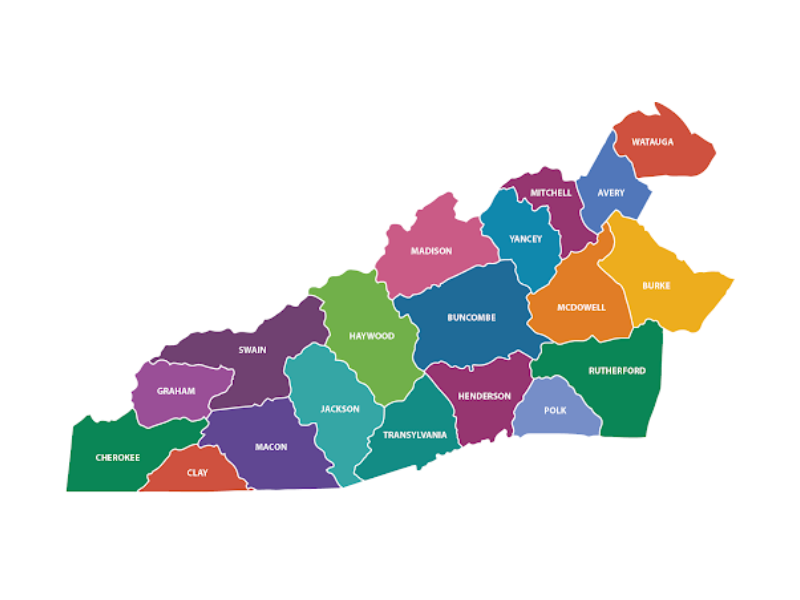Check out the full NC Local newsletter from September 28 for more from the Workshop, including industry news, job postings and shout-outs to journalists statewide. Sign up to get NC Local in your inbox every Wednesday.
By Eric Frederick, NC Local Newsletter Editor
When Shannan Bowen became executive director of the North Carolina Local News Workshop last year, her top priority was a listening project — to learn how communities, especially underserved ones, get (or don’t get) the news and information they need. The findings would then help news providers change, collaborate and innovate to engage and serve those communities better.
The pilot for that initiative is the Western North Carolina Research and Community Listening Project. With a grant from the NC Local News Lab Fund, the Workshop in February hired Asheville marketing strategist and researcher Brenda Murphree as a listening fellow to conduct that yearlong initiative in 19 mountainous counties, using a survey, one-on-one interviews and focus groups to assess the needs, find the gaps, and look for ways to fill them.

Murphree writes a monthly report on what she’s hearing, and shares updates at roundtables with news professionals. A lot of what residents have told her is what we’d expect (few institutional news sources, limited internet access, low trust in legacy outlets).
But she told me the other day that she also has learned some things:
Many residents are “welcoming, curious and open,” she says, after you put in the work to find them. Facebook groups are easily the most trusted news sources in many places; some of them have more members than their communities have people. And listening sessions go better when a trusted community member helps — as Murphree and Bowen found when they engaged a Cherokee tribal member to help conduct a session in the Qualla Boundary.
She has some other advice for anyone who wants to do a listening project:
◼️ Do preliminary research. Pull detailed census data; analyze it for trends. That helps identify communities to pinpoint for interviews and focus groups. Study the relevant research on news deserts and challenges to local news and information ecosystems.
◼️ Work your contacts. The best responses often come from outreach to folks you know, and the most helpful ones can come from activists and community organizers. Grassroots groups, social service organizations, nonprofits and local agencies can share links to your survey and inform constituents, clients and members about your project.
◼️ Allow time to build relationships and track down referrals. Everybody knows this takes time, but it’s easy to forget that in your planning.
◼️ Pull in an expert to review your survey as you develop it. Test it if you can; a consultant can streamline the process. Be willing to modify it as needed.
◼️ Select a survey platform with good data analysis capabilities. Free or low-cost survey tools might be tempting, but spend your money not for the survey but for the analysis and reports that the platform can provide.
◼️ Include some budget for marketing. Promotional materials and advertising will expand reach and awareness of your project. Nobody will take a survey they don’t know exists.
◼️ Listen! Once people trust you enough to open up, simply sitting back and listening to their thoughts and experiences will reveal a lot.
Bowen adds that it’s crucial to maintain the relationships you build, and it can help to include non-news organizations who want to understand information needs, such as health networks, in the project.
A final report next year will include proposals and calls to action for news and information providers.
While we’re on the subject…
- Where the citizens fill the gaps. Revisiting my report on the news/info landscape in Transylvania County after a calamity.
- Bowen and Erica Perel, director of UNC’s Center for Innovation and Sustainability in Local Media, will discuss community listening across budget and resource levels on October 27 during the three-day Independent News Sustainability Summit in Austin. View the Schedule | Learn More & Registration
- How to reach diverse audiences through listening. A trust tip from Trusting News.
- This webinar, October 12, includes Emma Carew Grovum, who’s leading the Upward:NC initiative for journalists of color in North Carolina: Authentic Listening: How to Grow a Diverse Audience By Building Trust. Learn more & Register
- This evergreen Local News Lab guide on hosting focus groups includes input from Philip Napoli, who’s now director of the DeWitt Wallace Center at Duke.
- Lessons learned from community listening during a pandemic. Fiona Morgan, Democracy Fund.
- The best ways to build audience and relevance by listening to and engaging your community. Mónica Guzmán, American Press Institute.
- Case studies on community listening and information ecosystem assessments. Listening Post Collective.


